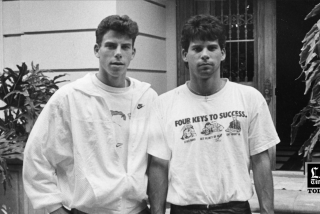What to watch as Eric Kay’s trial begins nearly three years after Tyler Skaggs’ death

- Share via
On a July afternoon more than two and a half years ago, Angels pitcher Tyler Skaggs was found dead in his hotel room in Southlake, Texas.
The sudden death of the popular 27-year-old sent shock waves through Major League Baseball. They intensified when the Tarrant County medical examiner ruled Skaggs died from “mixed ethanol, fentanyl and oxycodone intoxication” that led to choking on his own vomit.
What happened in Room 469 at the Hilton Dallas/Southlake Town Square brought professional baseball face to face with the country’s opioid epidemic and triggered a sprawling investigation by the Southlake Police Department and Drug Enforcement Administration that led to a longtime Angels front-office employee.
After several delays, jury selection is scheduled to begin Tuesday for the trial of Eric Kay, the team’s former communications director, who is charged in connection with Skaggs’ death.
The trial in U.S. District Court in Fort Worth will open a window into allegations Kay distributed opioids to Angels players, provide more details about the final days of Skaggs after an investigation where law enforcement released few details, and could pull in several team employees and former players.
The Times’ motion was filed in the criminal case against former Angels communications director Eric Kay, who is accused of providing the fentanyl that allegedly led to the pitcher’s fatal overdose.
Here’s a closer look at the case:
What are the charges?
Kay faces two counts: giving Skaggs counterfeit pills laced with fentanyl that resulted in his death and conspiring since at least 2017 to “conspiracy to possess with the intent to distribute” fentanyl and oxycodone.
After being charged July 30, 2020, and indicted two and a half months later, prosecutors secured a superseding indictment against Kay in November 2021 that expanded the second charge to include oxycodone. Prosecutors said the opioid was added so as not to confuse the jury, but defense attorneys told Judge Terry R. Means it necessitated revamping their strategy. He agreed, and delayed the trial that had been six days away.
Kay has pleaded not guilty.
Who could testify?
Prosecutors have filed an amended list of 78 potential witnesses. The vast majority won’t take the stand. But among the Angels employees, law enforcement and experts are seven former Angels players: Cam Bedrosian, C.J. Cron, Matt Harvey, Andrew Heaney, Mike Morin, Blake Parker and Garrett Richards.
The former players are important to watch because prosecutors said in a court filing in August 2021 they planned to present testimony from “approximately” five Major League Baseball players alleging they received oxycodone from Kay. Little more is known about this, other than the amounts ranged from “two to three pills while others would ask for up to 20 pills.”
The list of 35 possible witnesses filed by Kay’s attorneys added a handful of players: Justin Bour, Trevor Cahill, Noe Ramirez and Andrelton Simmons.
Has anyone else been implicated?
No one else is known to have been charged in the case. However, the list of exhibits filed by prosecutors last week includes immunity letters for three individuals identified by initials — C.C., M.M. and B.P. — plus grand jury and trial immunity orders for a fourth person identified as M.H.
One of the proposed voir dire questions by prosecutors adds to the intrigue: “In criminal cases there are times when individuals may have been involved in the alleged underlying criminal activity, but reach an agreement with the government that the information they provide to the government will not be used against them in a court of law. … In the event such persons are called as witnesses in this case, is there any member of the panel who would automatically reject the testimony of such a witness merely because of the agreement they have struck with the government?”
What evidence could be discussed?
The attorneys may cite records such as text messages and GPS location data connected to at least eight phone numbers — they include the numbers for Kay and Skaggs and a former Angels clubhouse attendant — plus account information from websites such as Venmo and OfferUp. There’s evidence seized from Skaggs’ hotel room (including a counterfeit 30-milligram oxycodone pill laced with fentanyl and legitimate painkilling medication) and items seized from Kay’s desk at Angel Stadium that law enforcement said tested positive for traces of various drugs. There are key card records from the Hilton, medical records and much, much more.
What are the big questions?
Can prosecutors prove that Kay gave Skaggs the counterfeit oxycodone pills that he crushed and snorted? And did that cause Skaggs’ death? A one-sentence allegation in the affidavit supporting the original complaint is key: “It was later determined that but for the fentanyl in [Skaggs’] system, [Skaggs] would not have died.”
There’s also the allegation Kay distributed opioids in the team’s clubhouse? How long did this occur? Which players got them? How many pills were involved? And who knew?
Federal prosecutors could call seven former Angels players as witnesses during the trial of Eric Kay in the fatal overdose of pitcher Tyler Skaggs.
How long might the trial take?
The judge issued an order last year giving the government 20 hours to make its case and the defense 15 hours to respond. He estimated a full day of trial will account for four to five hours from those totals. But neither total includes items such as final arguments.
More to Read
Go beyond the scoreboard
Get the latest on L.A.'s teams in the daily Sports Report newsletter.
You may occasionally receive promotional content from the Los Angeles Times.









